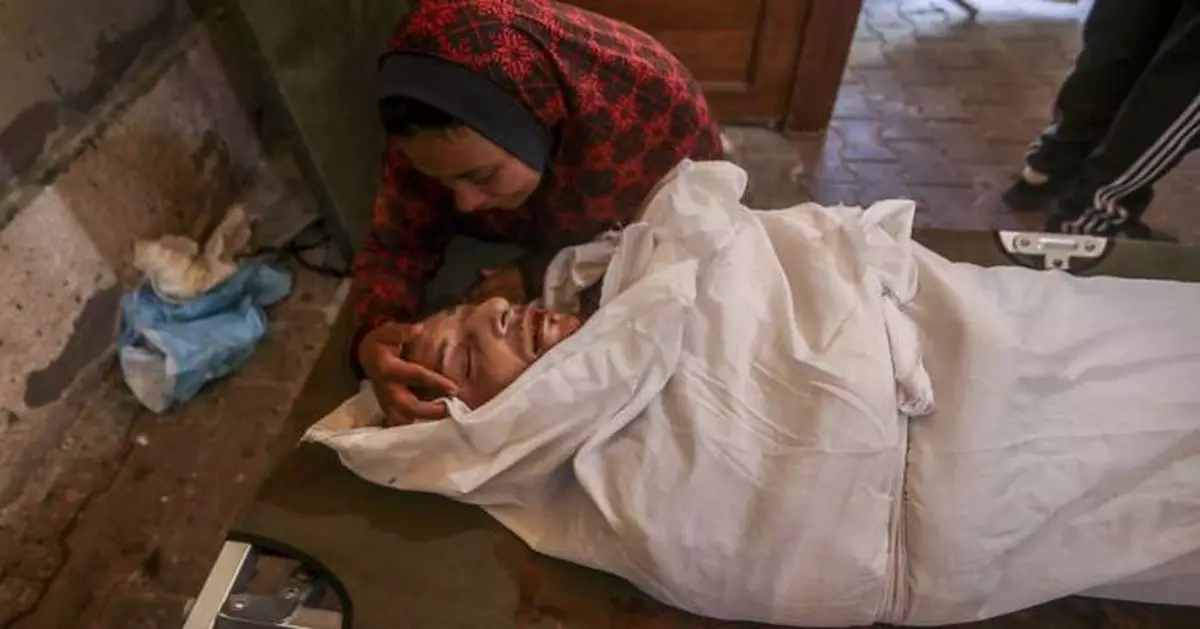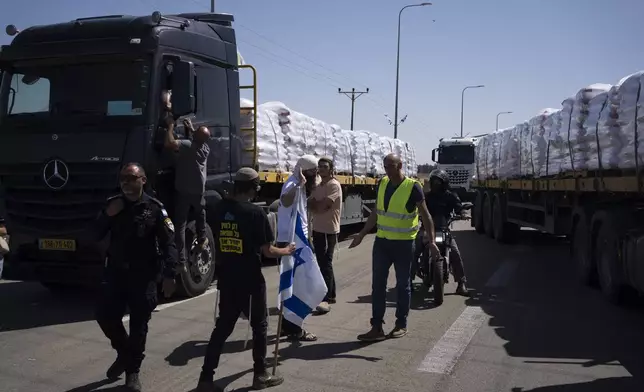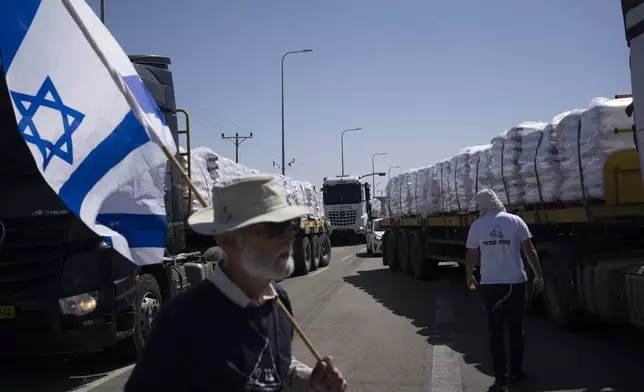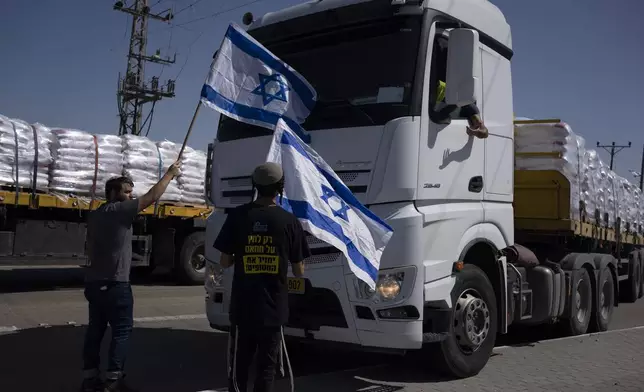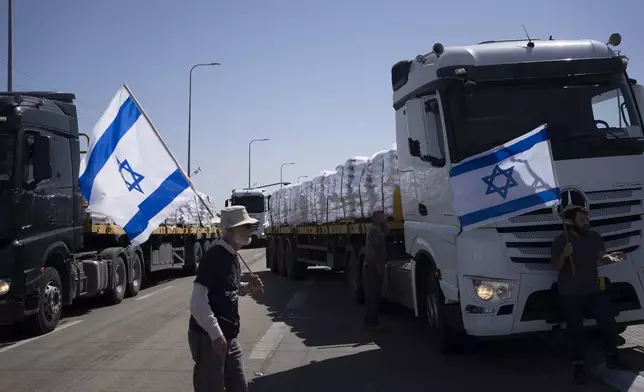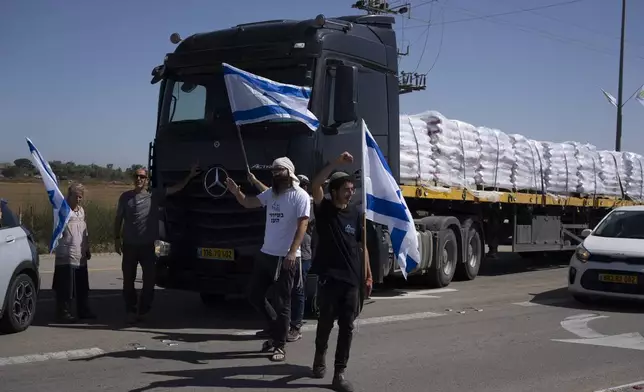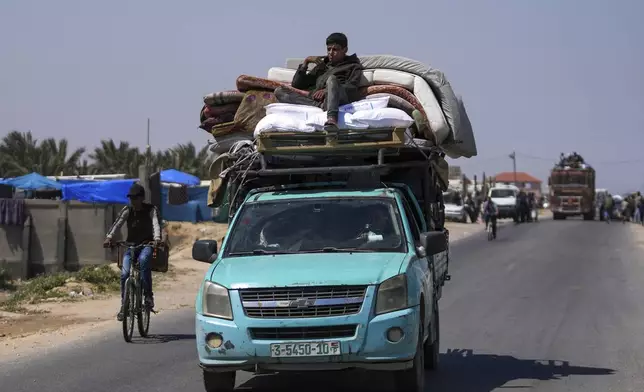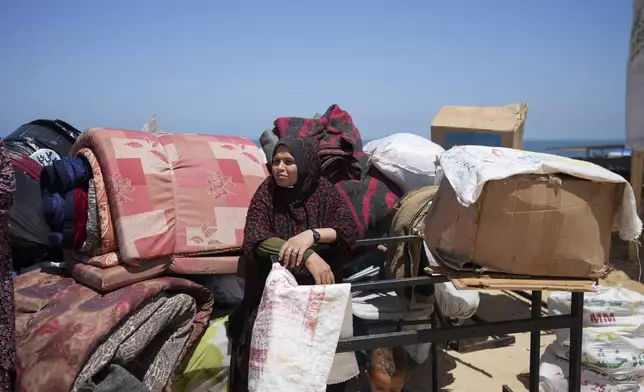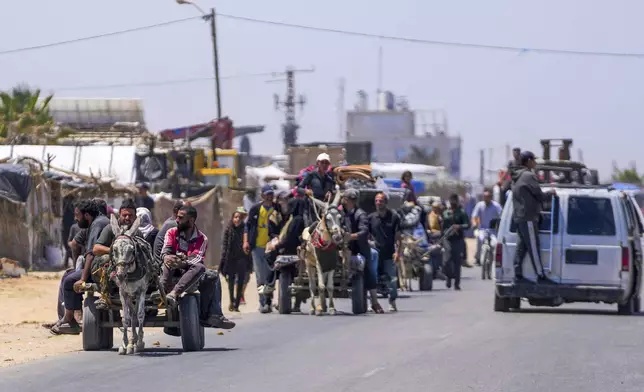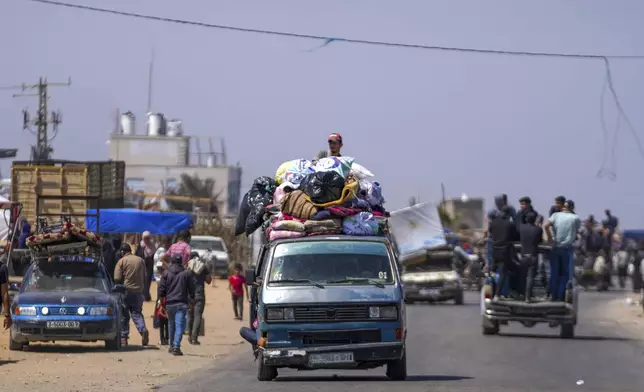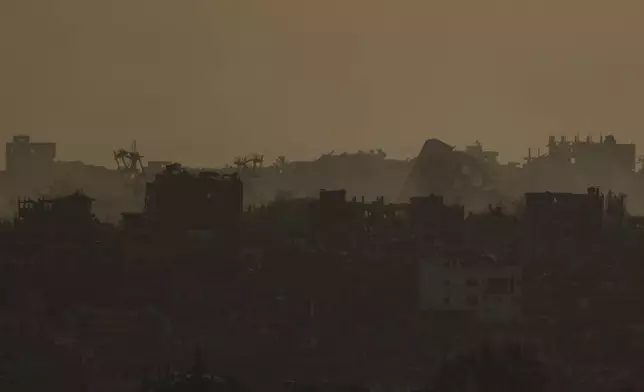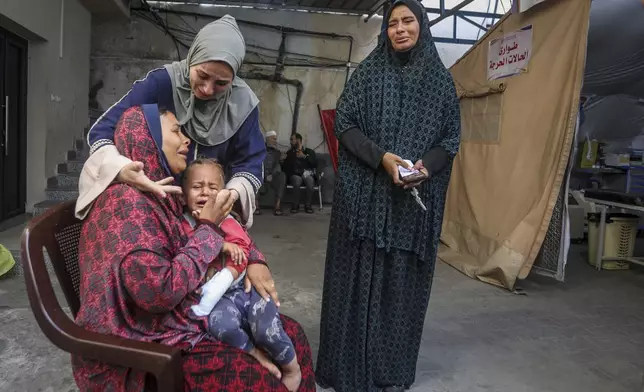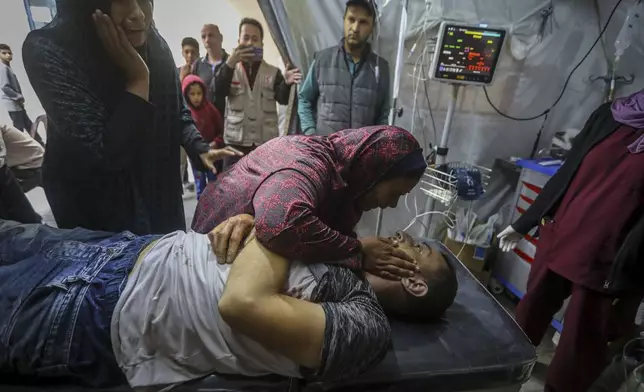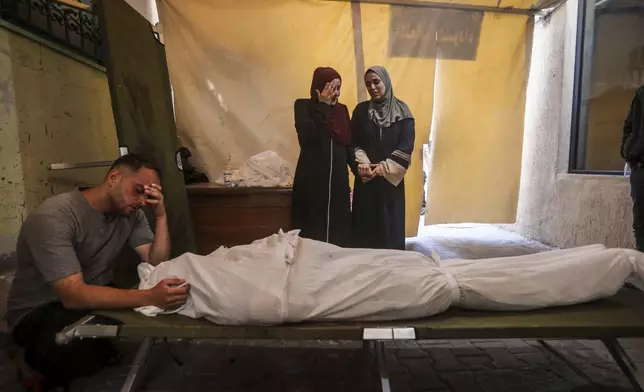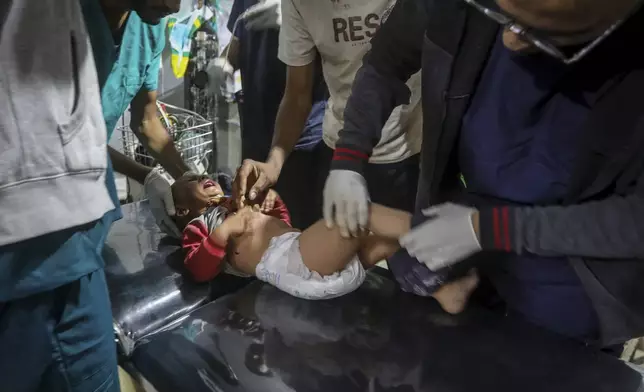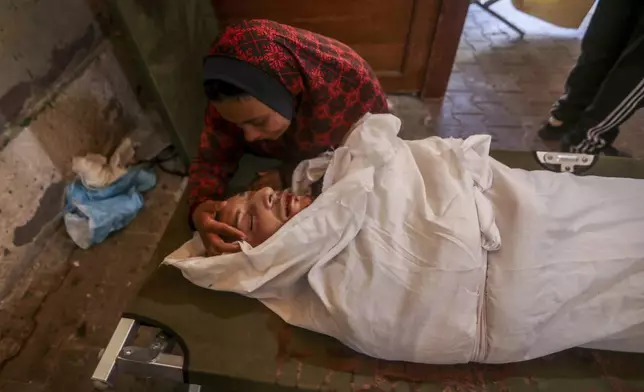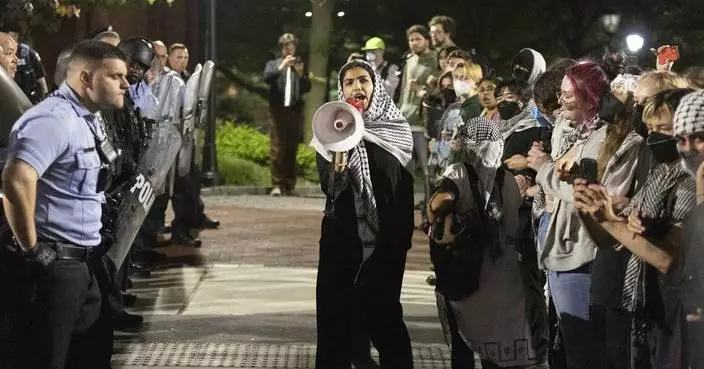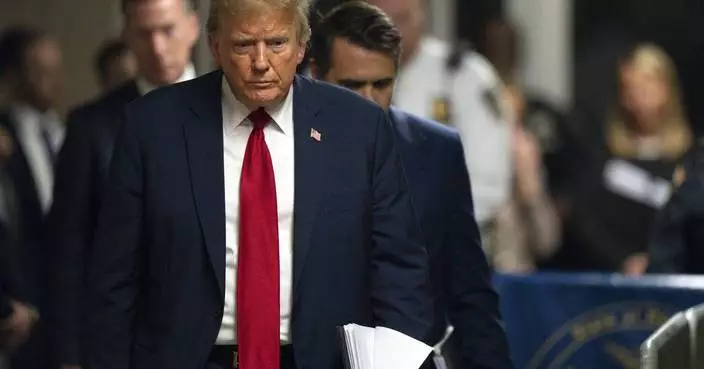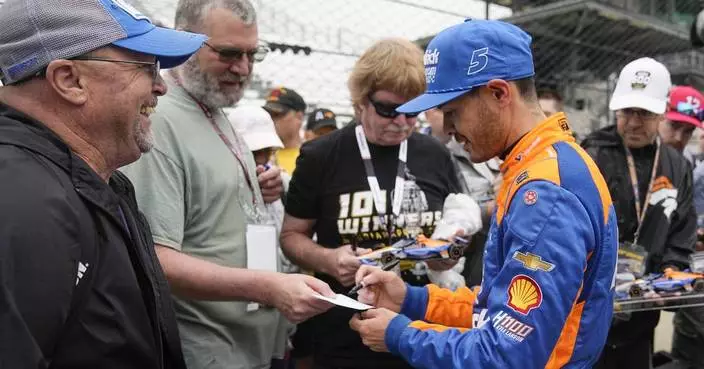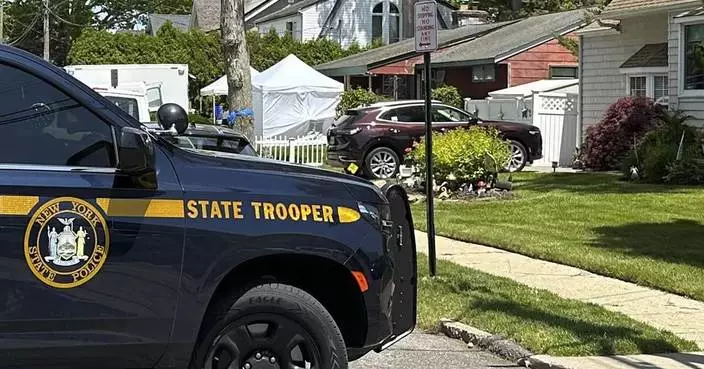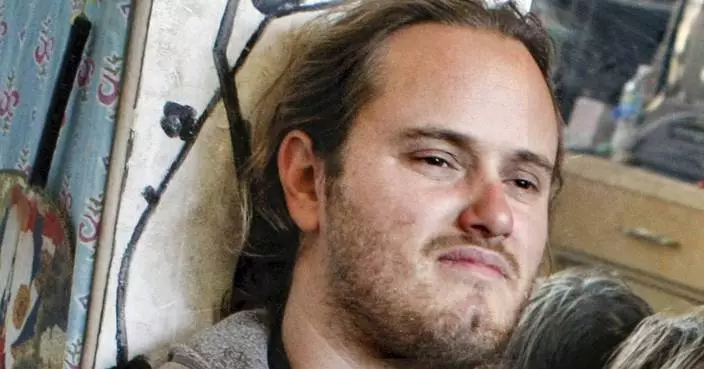RAFAH, Gaza Strip (AP) — Heavy fighting between Israeli troops and Palestinian militants on the outskirts of the southern Gaza city of Rafah has left crucial nearby aid crossings inaccessible and caused over 100,000 people to flee north, a United Nations official said Friday.
Israel's plans for a full-scale invasion of Rafah appear to be on hold for now, with the United States deeply opposed and stepping up pressure by threatening to withhold arms. But even the more limited incursion launched earlier this week threatens to worsen Gaza's humanitarian catastrophe.
Click to Gallery
RAFAH, Gaza Strip (AP) — Heavy fighting between Israeli troops and Palestinian militants on the outskirts of the southern Gaza city of Rafah has left crucial nearby aid crossings inaccessible and caused over 100,000 people to flee north, a United Nations official said Friday.
People block a road as they try to stop the trucks, carrying humanitarian aid, to enter in the Gaza Strip in an area near the Kerem Shalom border crossing between Israel and Gaza, in southern Israel, in Kerem Shalom, Thursday, May 9, 2024. (AP Photo/Leo Correa)
Holding Israeli flags people stand in front of trucks carrying humanitarian aid as they try to stop them to enter in the Gaza Strip in an area near the Kerem Shalom border crossing between Israel and Gaza, in southern Israel, in Kerem Shalom, Thursday, May 9, 2024. (AP Photo/Leo Correa)
Holding Israeli flags people stand in front of trucks carrying humanitarian aid as they try to stop them to enter in the Gaza Strip in an area near the Kerem Shalom border crossing between Israel and Gaza, in southern Israel, in Kerem Shalom, Thursday, May 9, 2024. (AP Photo/Leo Correa)
Holding Israeli flags people stand in front of trucks carrying humanitarian aid as they try to stop them to enter in the Gaza Strip in an area near the Kerem Shalom border crossing between Israel and Gaza, in southern Israel, in Kerem Shalom, Thursday, May 9, 2024. (AP Photo/Leo Correa)
Displaced Palestinians arrive in central Gaza after fleeing from the southern Gaza city of Rafah in Deir al Balah, Gaza Strip, on Thursday, May 9, 2024. The Israeli army has ordered tens of thousands of people to evacuate Rafah as it conducts a ground operation there. (AP Photo/Abdel Kareem Hana)
Displaced Palestinians arrive in central Gaza after fleeing from the southern Gaza city of Rafah in Deir al Balah, Gaza Strip, on Thursday, May 9, 2024. The Israeli army has ordered tens of thousands of people to evacuate Rafah as it conducts a ground operation there. (AP Photo/Abdel Kareem Hana)
Displaced Palestinians arrive in central Gaza after fleeing from the southern Gaza city of Rafah in Deir al Balah, Gaza Strip, on Thursday, May 9, 2024. The Israeli army has ordered tens of thousands of people to evacuate Rafah as it conducts a ground operation there. (AP Photo/Abdel Kareem Hana)
Displaced Palestinians arrive in central Gaza after fleeing from the southern Gaza city of Rafah in Deir al Balah, Gaza Strip, on Thursday, May 9, 2024. The Israeli army has ordered tens of thousands of people to evacuate Rafah as it conducts a ground operation there. (AP Photo/Abdel Kareem Hana)
Destroyed buildings in the Gaza Strip are seen during the sunset from southern Israel, Thursday, May 9, 2024. (AP Photo/Leo Correa)
Palestinians mourn their relatives killed in the Israeli bombardment of the Gaza Strip, at a hospital in Rafah, Gaza, Friday, May 10, 2024. (AP Photo/Ismael Abu Dayyah)
Palestinians mourn their relatives killed in the Israeli bombardment of the Gaza Strip, at a hospital in Rafah, Gaza, Friday, May 10, 2024. (AP Photo/Ismael Abu Dayyah)
Palestinians mourn their relatives killed in the Israeli bombardment of the Gaza Strip, at a hospital in Rafah, Gaza, Friday, May 10, 2024. (AP Photo/Ismael Abu Dayyah)
A Palestinian child wounded in the Israeli bombardment of the Gaza Strip is brought to a hospital in Rafah, Gaza, Friday, May 10, 2024. (AP Photo/Ismael Abu Dayyah)
Heavy fighting in Gaza's Rafah keeps aid crossings closed, sends 100,000 civilians fleeing
Heavy fighting in Gaza's Rafah keeps aid crossings closed, sends 100,000 civilians fleeing
Palestinians mourn their relatives killed in the Israeli bombardment of the Gaza Strip, at a hospital in Rafah, Gaza, Friday, May 10, 2024. (AP Photo/Ismael Abu Dayyah)
Heavy fighting was also underway in northern Gaza, where Hamas appeared to have once again regrouped in an area where Israel has already launched punishing assaults.
Over a million Palestinians have fled to Rafah to escape fighting elsewhere, with many packed into U.N.-run shelters or squalid tent camps. The city on the border with Egypt is also a crucial hub for bringing in food, medicine, fuel and other goods.
The UN’s Office for the Coordination of Humanitarian Affairs, known as OCHA, says about 110,000 people have fled Rafah and that food and fuel supplies in the city are critically low. Georgios Petropoulos, an OCHA official working in Rafah, said the two main crossings near the city remain closed, cutting off supplies and preventing medical evacuations and the movement of humanitarian staff.
“Even if there were assurances to us being able to pass through a corridor, the proximity so close to a military involved in fighting is just not acceptable for something that has to be a humanitarian zone," he said.
The U.N.'s World Food Program will run out of food for distribution in southern Gaza by Saturday unless more aid arrives, Petropoulos said. He said about 30,000 people were leaving Rafah daily in search of safety, but that humanitarian workers had no supplies to help them set up camp in a new location.
“We simply have no tents, we have no blankets, no bedding, none of the items that you would expect a population on the move to be able to get from the humanitarian system,” he said.
Israeli troops captured the Gaza side of the Rafah crossing with Egypt on Tuesday, forcing it to shut down. Rafah was the main point of entry for fuel needed to power vehicles, as well as the generators on which hospitals and water treatment plants rely.
Israel says the nearby Kerem Shalom crossing — Gaza's main cargo terminal — is open on its side, but the U.N. says it remains inaccessible on the Gaza side because of ongoing fighting.
Israeli troops are battling Palestinian militants in eastern Rafah, not far from the crossings. An Associated Press reporter in the city heard heavy artillery and gunfire throughout the night into Friday.
The military said in a statement that it had located several tunnels and eliminated militants “during close-quarters combat and with an aerial strike.”
Hamas’ military wing said it carried out a complex attack in which it struck a house where Israeli troops had taken up position, an armored personnel carrier and soldiers operating on foot. There was no comment from the Israeli military,
It is not possible to independently confirm battlefield accounts from either side.
Hamas also said it launched a number of mortar rounds at the Kerem Shalom crossing, close to where Israeli troops are operating. The military said it intercepted two launches. The crossing was initially closed after a Hamas rocket attack last weekend that killed four Israeli soldiers.
Israel says Rafah is the last Hamas stronghold in Gaza and key to its goal of dismantling the group's military and governing capabilities and returning scores of hostages captured in Hamas' Oct. 7 attack that triggered the war.
But Hamas has repeatedly regrouped, even in the hardest-hit parts of Gaza.
Heavy battles erupted this week in the Zeitoun area on the outskirts of Gaza City in the northern part of the territory. Northern Gaza was the first target of the ground offensive, and Israel said late last year that it had mostly dismantled Hamas there.
The north remains largely isolated by Israeli troops, and the U.N. says the estimated 300,000 people there are experiencing “full-blown famine.”
Israeli Prime Minister Benjamin Netanyahu has vowed to proceed with the offensive with or without U.S. arms, saying “we will fight with our fingernails” if needed in a defiant statement late Thursday. The Israeli military says it has what it needs for the missions it has planned, including in Rafah.
The war began with Hamas’ surprise attack into southern Israel last year, in which it killed some 1,200 people, mostly civilians, and took another 250 hostage. The militants are still holding some 100 captives and the remains of more than 30 after most of the rest were released during a cease-fire last year.
The war has killed over 34,800 Palestinians, mostly women and children, according to the Gaza Health Ministry, which does not distinguish between civilians and combatants in its figures. Israel’s offensive, waged with U.S.-supplied munitions, has caused widespread devastation and forced some 80% of Gaza’s population to flee their homes.
Israel's surprise incursion into Rafah complicated what had been months of efforts by the U.S., Qatar and Egypt to broker a cease-fire and the release of hostages. Hamas this week said it had accepted an Egyptian-Qatari cease-fire proposal, but Israel says the plan does not meet its “core” demands. Several days of follow-up talks appeared to end inconclusively on Thursday.
Hamas has demanded guarantees for an end to the war and a full Israeli withdrawal from Gaza as part of any deal — steps Israel has ruled out.
Krauss reported from Jerusalem. Associated Press writer Stephen Graham in Berlin contributed.

People block a road as they try to stop the trucks, carrying humanitarian aid, to enter in the Gaza Strip in an area near the Kerem Shalom border crossing between Israel and Gaza, in southern Israel, in Kerem Shalom, Thursday, May 9, 2024. (AP Photo/Leo Correa)

People block a road as they try to stop the trucks, carrying humanitarian aid, to enter in the Gaza Strip in an area near the Kerem Shalom border crossing between Israel and Gaza, in southern Israel, in Kerem Shalom, Thursday, May 9, 2024. (AP Photo/Leo Correa)

Holding Israeli flags people stand in front of trucks carrying humanitarian aid as they try to stop them to enter in the Gaza Strip in an area near the Kerem Shalom border crossing between Israel and Gaza, in southern Israel, in Kerem Shalom, Thursday, May 9, 2024. (AP Photo/Leo Correa)

Holding Israeli flags people stand in front of trucks carrying humanitarian aid as they try to stop them to enter in the Gaza Strip in an area near the Kerem Shalom border crossing between Israel and Gaza, in southern Israel, in Kerem Shalom, Thursday, May 9, 2024. (AP Photo/Leo Correa)

Holding Israeli flags people stand in front of trucks carrying humanitarian aid as they try to stop them to enter in the Gaza Strip in an area near the Kerem Shalom border crossing between Israel and Gaza, in southern Israel, in Kerem Shalom, Thursday, May 9, 2024. (AP Photo/Leo Correa)

Displaced Palestinians arrive in central Gaza after fleeing from the southern Gaza city of Rafah in Deir al Balah, Gaza Strip, on Thursday, May 9, 2024. The Israeli army has ordered tens of thousands of people to evacuate Rafah as it conducts a ground operation there. (AP Photo/Abdel Kareem Hana)

Displaced Palestinians arrive in central Gaza after fleeing from the southern Gaza city of Rafah in Deir al Balah, Gaza Strip, on Thursday, May 9, 2024. The Israeli army has ordered tens of thousands of people to evacuate Rafah as it conducts a ground operation there. (AP Photo/Abdel Kareem Hana)

Displaced Palestinians arrive in central Gaza after fleeing from the southern Gaza city of Rafah in Deir al Balah, Gaza Strip, on Thursday, May 9, 2024. The Israeli army has ordered tens of thousands of people to evacuate Rafah as it conducts a ground operation there. (AP Photo/Abdel Kareem Hana)

Displaced Palestinians arrive in central Gaza after fleeing from the southern Gaza city of Rafah in Deir al Balah, Gaza Strip, on Thursday, May 9, 2024. The Israeli army has ordered tens of thousands of people to evacuate Rafah as it conducts a ground operation there. (AP Photo/Abdel Kareem Hana)

Destroyed buildings in the Gaza Strip are seen during the sunset from southern Israel, Thursday, May 9, 2024. (AP Photo/Leo Correa)

Palestinians mourn their relatives killed in the Israeli bombardment of the Gaza Strip, at a hospital in Rafah, Gaza, Friday, May 10, 2024. (AP Photo/Ismael Abu Dayyah)

Palestinians mourn their relatives killed in the Israeli bombardment of the Gaza Strip, at a hospital in Rafah, Gaza, Friday, May 10, 2024. (AP Photo/Ismael Abu Dayyah)

Palestinians mourn their relatives killed in the Israeli bombardment of the Gaza Strip, at a hospital in Rafah, Gaza, Friday, May 10, 2024. (AP Photo/Ismael Abu Dayyah)

A Palestinian child wounded in the Israeli bombardment of the Gaza Strip is brought to a hospital in Rafah, Gaza, Friday, May 10, 2024. (AP Photo/Ismael Abu Dayyah)

Heavy fighting in Gaza's Rafah keeps aid crossings closed, sends 100,000 civilians fleeing

Heavy fighting in Gaza's Rafah keeps aid crossings closed, sends 100,000 civilians fleeing

Palestinians mourn their relatives killed in the Israeli bombardment of the Gaza Strip, at a hospital in Rafah, Gaza, Friday, May 10, 2024. (AP Photo/Ismael Abu Dayyah)
In an isolated part of the U.S. Drug Enforcement Administration headquarters known as the 12th-floor “bubble,” chief Anne Milgram made an unusual request of top deputies summoned in March for what she called the “Marijuana Meeting”: Nobody could take notes.
Over the next half hour, she broke the news that the Biden administration would soon be issuing a long-awaited order reclassifying pot as a less-dangerous drug, a major hurdle toward federal legalization that DEA has long resisted. And Milgram went on to reveal another twist, according to two people familiar with the private meeting who spoke to The Associated Press on condition of anonymity, that the process normally steered by the DEA had been taken over by the U.S. Justice Department and the action would not be signed by her but by Attorney General Merrick Garland.
Milgram didn't give aides a reason for the unprecedented omission and neither she nor the DEA has explained since. But it unfolded this past week exactly as laid out in that meeting two months ago, with the most significant drug policy change in 50 years launched without the support of the nation’s premier narcotics agency.
“DEA has not yet made a determination as to its views of the appropriate schedule for marijuana,” reads a sentence tucked 13 pages into Garland’s 92-page order last Thursday outlining the Biden administration proposal to shift pot from its current Schedule I alongside heroin and LSD to the less tightly regulated Schedule III with such drugs as ketamine and some anabolic steroids.
Internal records accompanying the order indicate the DEA sent a memo to the Justice Department in late January seeking additional scientific input to determine whether marijuana has an accepted medical use, a key requirement for reclassification. But those concerns were overruled by Justice Department attorneys, who deemed the DEA’s criteria “impermissibly narrow.”
Several current and former DEA officials told the AP they believe politics may be at play, contending the Justice Department is moving forward with the marijuana reclassification because President Joe Biden wants to use the issue to woo voters in his re-election campaign and wasn’t willing to give the DEA time for more studies that likely would have dragged beyond Election Day.
Those officials also noted that while the Controlled Substances Act grants the attorney general responsibility for regulating the sale of dangerous drugs, federal law still delegates the authority to classify drugs to the DEA administrator.
“It’s crystal clear to me that the Justice Department hijacked the rescheduling process, placing politics above public safety,” said Derek Maltz, a retired agent who once headed the DEA’s Special Operations Division. “If there’s scientific evidence to support this decision, then so be it. But you’ve got to let the scientists evaluate it.”
Former DEA Administrator Tim Shea said the striking absence of Milgram’s sign-off suggests she was backing “the DEA professionals.”
“If she had supported it she would have signed it and sent it in,” said Shea, who served in the Trump administration. “DEA was opposed to this and the politics entered and overruled them. It’s demoralizing. Everybody from the agents in the streets to the leadership in DEA knows the dangers this brings.”
The White House did not respond to a request for comment but Press Secretary Karine Jean-Pierre previously said Biden was committed to fulfilling a 2020 campaign promise. “He said no person, no American who possesses marijuana should go to jail. It is affecting communities across the country, including communities of color.”
Justice Department attorneys defended Garland’s decision to proceed without Milgram’s backing, saying in a separate memo that the action was prompted by “sharply different views” between DEA and the Department of Health and Human Services. The HHS last year recommended reclassifying marijuana, deeming it less risky to public health than cocaine, heroin and oxycodone, and effective in treating anorexia, pain and other ailments.
HHS concluded in part that “although abuse of marijuana produces clear evidence of a risk to public health, that risk is relatively lower than” that posed by other drugs.
The DEA balked at those findings and Garland’s order cites at least 10 times when the drug agency requested additional information before blessing HHS’ medical findings. It did not respond to AP questions seeking further comment.
The Justice Department didn't comment on internal differences but in a statement said that the proposal was “consistent with the scientific and medical determinations of HHS."
The dissonance within the federal government underscores the continuing debate over the risks posed by cannabis, even as 38 states have legalized medical marijuana and 24 have legalized its recreational use. All the while, more voters — 70% of adults, according to a Gallup poll last fall — support legalization, the highest level yet recorded by the polling firm.
“The argument that marijuana is as dangerous as fentanyl, cocaine and meth is laughable,” said Matthew C. Zorn, a Houston-based attorney who writes a newsletter on cannabis regulation. “The DEA isn’t where most Americans are. They’re standing on the wrong side of history.”
But even HHS’ National Institute on Drug Abuse has come out with statements in apparent conflict with HHS’ recommendation to reclassify pot, saying the potency of marijuana has been steadily increasing over the years, resulting in higher numbers of emergency room visits to treat a wide range of physical and mental effects, from breathing problems and mental impairment to hallucinations and paranoia.
“Whether smoking or otherwise consuming marijuana has therapeutic benefits that outweigh its health risks is still an open question that science has not resolved,” Nora Volkow, a neuroscientist who leads NIDA, is currently quoted as saying on the institute’s website. She did not immediately respond to the AP's request for comment.
The NIDA last performed a medical evaluation of marijuana in 2015 — a year before the Obama administration's DEA rejected a similar request to reschedule the drug.
This time, after Biden ordered a review of the drug’s status in 2022, HHS adopted new criteria to reach its rescheduling conclusion, taking into account the states that have already legalized medical marijuana.
The rescheduling move, first reported by the AP last month, faces a potentially lengthy process. The DEA, which is not bound by HHS' medical determinations at this point, will take public comment on the rescheduling plan before a review by an administrative judge and the publishing of a final rule. Federal prosecutions involving marijuana are already exceedingly rare but a Schedule III classification would still make pot a controlled substance subject to rules and regulations
For her part, Milgram has said little about her stance on marijuana and was not asked about it during her confirmation. When she took the helm of the agency in 2021, she privately told colleagues she considered the legalization debate a distraction from the far more serious fentanyl crisis, according to one of the people who spoke to the AP.
Milgram is known for a progressive, data-driven approach to law enforcement dating to her days as the Democratic attorney general of New Jersey. When the state’s governor, a close ally, signed a bill in 2010 making the state the 14th to make marijuana legal for medical purposes, she said only that the legislation was “workable.”
This past week, she was similarly opaque in a three-sentence announcement to DEA employees obtained by the AP.
“As required,” she wrote, “the DEA will post this notice and all attachments on our website.”
Goodman reported from Miami, Mustian from New York. AP Writer Lindsay Whitehurst in Washington contributed.
Contact AP’s global investigative team at Investigative@ap.org or https://www.ap.org/tips/

FILE - Attorney General Merrick Garland speaks during a news conference at Department of Justice headquarters in Washington, March 21, 2024. The Biden administration’s push to reclassify marijuana as a less-dangerous drug is going forward without the support of the nation’s premier narcotics agency. Newly released government records show the Drug Enforcement Administration requested more information on supporting science to reclassify marijuana but the Justice Department decided to move ahead without the drug agency’s signoff — an unprecedented omission. (AP Photo/Jose Luis Magana, File)

FILE - An indoor cannabis farm in Gardena, Calif., is seen, Aug. 15, 2019. The Biden administration’s push to reclassify marijuana as a less-dangerous drug is going forward without the support of the nation’s premier narcotics agency. Newly released government records show the Drug Enforcement Administration requested more information on supporting science to reclassify marijuana but the Justice Department decided to move ahead without the drug agency’s signoff — an unprecedented omission. (AP Photo/Richard Vogel, File)

FILE - DEA Administrator Anne Milgram speaks during a news conference at the Justice Department in Washington, Friday, April 14, 2023. The Biden administration’s push to reclassify marijuana as a less-dangerous drug is going forward without the support of the nation’s premier narcotics agency. Newly released government records show the Drug Enforcement Administration requested more information on supporting science to reclassify marijuana but the Justice Department decided to move ahead without the drug agency’s signoff — an unprecedented omission. (AP Photo/Susan Walsh, File)



















